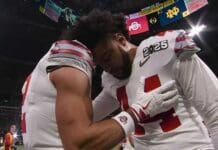In his speech at The Gospel Coalition’s 2019 National Conference, rapper and author Trip Lee challenged the audience that healing is not something Christians “name and claim” from the Lord. Rather, it is something we request out of humility, recognizing the character of the one we are approaching. Lee’s message was even more powerful given the fact that he has suffered from a chronic illness for the past 12 years.
“The kind of faith that the Bible’s talking about is very different than what we do…where sometimes we will just come up with something and say, ‘I have faith that God is going to do that.” But “giving God an assignment and holding Him to it” is not true faith, says Trip Lee. Rather, “faith is believing that God is who He said He is and will do what He said he will do. And if we are clearer that that’s what faith is…then we will be clear what it means to try to persevere in that faith and hold on to that faith.”
Trip Lee: Learning from the Leper and the Centurion
The scripture passage that Lee chose as the basis for his talk was Matthew 8:1-13, which describes Jesus healing a leper, as well as the servant of a centurion. Lee emphasized the importance not only of approaching the right person with our brokenness but also of approaching Him in the right way. Both the leper and the centurion had confidence that Jesus had the power to help them, and they had deep humility in how they made their requests. The leper, for example, knelt before Jesus. Lee points out that when the leper said, “Lord, if you are willing, you can make me clean,” he used the phrase, “if you are willing.” This makes it clear that the leper is not demanding to be healed. The leper also says “you can.” He does not question Jesus’ ability, but His willingness.
“Real faith isn’t demanding,” says Trip Lee. “He doesn’t say, you’re Jesus, you gotta do this. He doesn’t say, you healed other people, now it’s my turn.”
The centurion also exhibits great faith and humility when he asks Jesus to heal his servant. The centurion says to Him, “Lord, my servant lies at home paralyzed, suffering terribly.” When Jesus offers to come to his home to heal the servant, the centurion says he is unworthy for Jesus even to come under his roof, but that he knows Jesus can heal the servant just by speaking. Again, Lee points out that the centurion has remarkable faith (which amazes even Jesus) and humility. This humility, says Lee, is similar to when Isaiah stands in the presence of God and says, “I am ruined! For I am a man of unclean lips,” or when John the Baptist says he is not worthy to untie Jesus’ sandals. This, says Lee, is how we ought to approach God with our requests.
Tests of Faith
“To read passages like these, if I’m honest, can be difficult,” says Lee. He has chronic fatigue syndrome and says that dealing with that illness has been “the hardest part of every part of my life.” That past week, there were several times when he slept a full night and then had to spend another 10 hours in bed the next day. A passage like Matthew 8 makes it sound so easy for Jesus to heal people. So why not him? And why not the other people in our lives who are suffering and who haven’t been healed yet?
There are several truths Trip Lee believes we need to keep in mind. We need to be careful about how we apply passages like Matthew 8. That passage is not intended to teach us that God will heal us any time we ask Him to, if we only have enough faith. The idea that God will heal us if we have enough faith is false teaching. It’s also helpful to remember that Jesus’ miracles were a special evidence at the time of His kingdom and the credibility of His ministry.
Another important truth is that God does not allow anything in our lives to “slip by” Him unnoticed. He uses everything we experience for our good. This is hard to accept, but we also need to recognize that if we expect God to give us what we want (even if we have good requests) and lose faith if He doesn’t, we are turning God into a genii who answers our wishes on demand. Lee says, “Some of us are struggling with our faith in Jesus because He hasn’t done things that He never said He would do in the first place.” And even if we don’t struggle with our faith, we often “struggle with gratitude and contentment as long as we don’t understand that every single thing we have is a gift from Jesus.”
Finally, God’s “no” is not the end of His story, which promises ultimate healing and restoration. So while God could miraculously heal us now, if He chooses not to, the worst case scenario is that His answer is “not yet.” Even if He chooses not to heal us at this time, we need to persevere in our faith and feed it by dwelling on His word, which reminds us that God is good, holy, and faithful.
Lee closes by saying, “So for those of us who are struggling with what life looks like in this broken world…the good news for us is we’re no longer searching for the one who is willing and able. We know who it is. And if there’s something in our lives that He hasn’t made whole yet, we’re not looking for someone else to do it. We’re waiting for the day that He will.”














